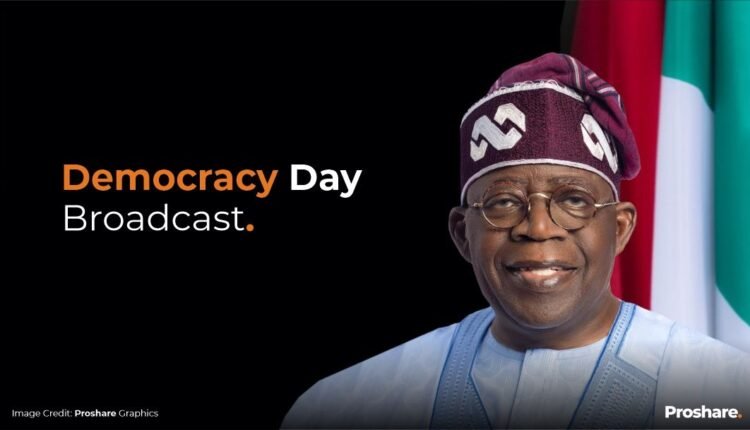Democracy Day Speech: Economic gains not yet felt by Nigerians, says Statistician
Democracy Day Speech: Economic gains not yet felt by Nigerians, says Statistician
Abia-based Statistician, Mr Ikenna Ebiri, has said that the economic gains highlighted by President Bola Tinubu in his Democracy Day speech have yet to translate into meaningful relief for ordinary Nigerians.
Ebiri said this while reacting to the Thursday’s national broadcast in an interview with the News Agency of Nigeria (NAN) in Umuahia.
He acknowledged the reported 3.4 per cent economic growth in 2024, calling it “impressive on paper,” but warned it had yet to reflect in everyday life.
“The 4.6 per cent last-quarter growth sounds great, but rice and garri prices are still climbing,” Ebiri said.
He also said admitted reported improvements in foreign reserves and credit ratings, saying they matter, but “not if unemployment remains high and wages stagnant”.
Ebiri described the CREDICORP loans to civil servants and youths as a welcome development.
According to him, soft credit helps, but there is the need for wider and clearer access to such funds.
He praised plans for a fibre optic rollout, describing it as “a potential game-changer” for students, startups, and the digital economy.
“Internet expansion can spark opportunity, but only if it’s affordable and reliable for everyone,” Ebiri said.
The statistician described the tax reforms and ₦100 billion credit guarantee as positive signals for SMEs, if truly accessible.
He expressed concern over the lack of specific reliefs for small traders, artisans, and people with disabilities, calling their omission “a missed opportunity”.
Ebiri said that the talk about easing inflation “feels disconnected, when food prices keep rising and requires Federal Government to urgently address the issue”.
He said that he was sceptical about Tinubu’s seven per cent growth target, because he felt there was no plan on ground to achieve it.
He said that the absence of firm unemployment figures had the potential to weaken the confidence of the citizens in the government’s job creation claims.
“The speech ticked boxes for investors, but didn’t speak clearly to the okada rider or the market woman,” he said.
Ebiri said that Nigerians needed “concrete policies that reduce daily hardship, not just hopeful projections”.
In a related development, a civil servant, Mr Chukwuma Igwe, said the nation had made political progress despite its ongoing challenges under democratic governance since 1999.
Igwe said: “The greatest achievement of this democratic dispensation is continuity.
“We have not had any military takeover since 1999 and that alone is progress.”
He acknowledged that civil liberties had improved, with Nigerians now enjoying more freedom of speech, association, and access to information than during military regimes.
“People are freer to speak, criticise leaders, and participate in governance, and that wasn’t possible in the past,” he said.
Igwe, however, expressed concern that democracy had not translated to real development for most Nigerians, especially in rural and underserved communities.
“We are practising democracy, but many are still poor, jobless, and without basic services, and that is troubling,” he further said.
He criticised the weakness of institutions, such as the legislature, judiciary and electoral bodies, citing political interference and corruption as major threats to democratic consolidation.
“These institutions must be independent and strong; otherwise, democracy is just a name,” Igwe said.
He, however, expressed optimism that things would improve and praised Nigerian youths for showing greater political awareness and demanding accountability from public officials.
He urged political leaders to see democracy as service to the people, not just a route to power and personal enrichment.
“Leadership should be about service, not selfish gain. Our people deserve better.
“Nigeria celebrates Democracy Day every June 12, honouring the 1993 election annulled by the military, widely regarded as the freest in the country’s history.
“The day serves as a reminder of Nigeria’s struggle for freedom, justice, and accountable leadership in a democratic setting,” he said.
In a Democracy Day speech, Gov. Alex Otti of Abia hailed democracy as “Nigeria’s most cherished political system”.
Otti said that the celebration represents Nigeria’s political rebirth and a day for reflection on the journey since the return to civil rule.
Read Also: Envoys seek effective free speech protection, cybercrime…
He said that democracy remains the best form of governance, anchored on credible elections, free expression, and pursuit of the common good.
He acknowledged that democracy in Nigeria remained far from perfect, citing poverty, insecurity, and poor infrastructure as concerns affecting citizens across board.
He blamed voter apathy and electoral malpractice for worsening public discontent and urged Nigerians to defend democratic values in everyday actions.
According to him, bribery, sabotage, and silence in the face of wrongdoings hurt democratic growth more than guns ever could.
The governor, however, said that there had been progress in infrastructure, digital innovation, and economic growth, especially in the private sector, under democracy.
He commended the nation’s expanding democratic space and increasing citizen participation in governance, accountability, and civic advocacy.
Otti described the sacrifices of late Chief M.K.O. Abiola and other fallen heroes of democracy as the foundation of today’s freedoms.
He also paid tribute to Abia sons, like Ndubuisi Kanu, Chima Ubani, and Ebitu Ukiwe for their roles in Nigeria’s democratic struggle.
He said that democracy must empower citizens, protect rights, and guard against elite domination, no matter the season or the leadership.
The governor described Abia’s current transformation as proof that democracy works when leaders are accountable and citizens remain vigilant.
He urged residents to remain engaged beyond voting, by questioning elected leaders and fulfilling civic duties, like tax payment.
He said that democracy thrives when people use their power responsibly, “not just during elections but in everyday governance”.
While wishing Nigerians a happy Democracy Day celebration, the Abia chief executive called for unity in protecting democratic gains.

